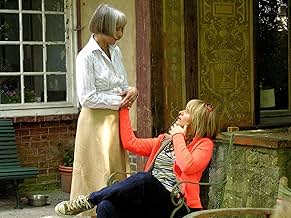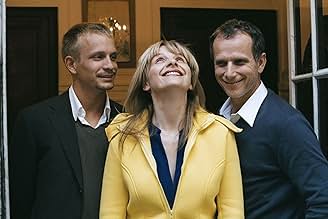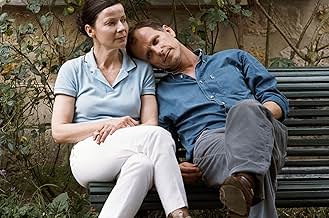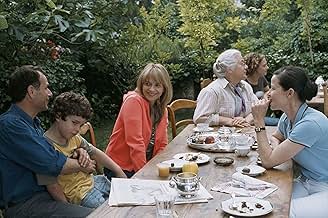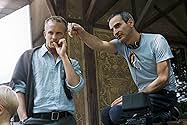ÉVALUATION IMDb
7,1/10
8,5 k
MA NOTE
Deux frères et une soeur assistent à la disparition de leurs souvenirs d'enfance lorsqu'ils doivent abandonner les biens familiaux pour assurer la succession de leur mère décédée.Deux frères et une soeur assistent à la disparition de leurs souvenirs d'enfance lorsqu'ils doivent abandonner les biens familiaux pour assurer la succession de leur mère décédée.Deux frères et une soeur assistent à la disparition de leurs souvenirs d'enfance lorsqu'ils doivent abandonner les biens familiaux pour assurer la succession de leur mère décédée.
- Prix
- 9 victoires et 23 nominations au total
Avis en vedette
SUMMER HOURS (L'heure d'été) is more of a reverie than a story for a film. This very French film touches the subject of family - the meaning and influence and contradictions - in an examination of coping with the death of the matriarch and her wishes versus the intentions of the siblings. Writer/Director Olivier Assayas seems less interested in allowing the viewer to get to know the individuals of the story than he is with conveying the vacuum of death and the aftermath of dealing with it in the setting of a family of grown children.
The film opens as it closes - in summer with scenes awash with French countryside living. Three children have gathered with their families for the 75th birthday of their mother, the elegant and wistful Hélène (Edith Scob) whose adoration of her famous painter uncle presses on her mind as she senses her own mortality. One son, Frédéric (Charles Berling) is her confidant in hearing her wishes about the dispersal of the house and furniture and art that mean so much to her. Her other son Jérémie (Jérémie Renier) has traveled from his new home in China where his tennis shoes company has stationed him: his fondness for his mother is apparent but his need for financing makes him view the wishes of his mother in a more practical light. Her daughter Adrienne (Juliet Binoche) has traveled from her preferred new home in New York City and views the wishes of her mother with a similar practical and somewhat distant stance.
Some time later the mother dies and the children gather for the funeral and for the discussion of what to do with the 'inheritance'. The interplay between the sentimental Frédéric and the pragmatic Adrienne and Jérémie bring about questions of placing the art and furniture with museums and the selling of the house of their youth. Gentle undertones of sibling relationships and questions about the quality of memorabilia versus the practicality of getting on with living provide the final movement. The film ends in a coda that returns the younger generation (Hélène's grandchildren) to the beauty of the gardens of the now empty French house. The thread that holds the film together is the presence of the longtime housekeeper Éloïse (Isabelle Sadoyan), the gentle being that understands it all.
Though the film is beautifully acted and photographed there is very little development of the various characters, a fact that leaves the viewer with the feeling of simply peeking through a windowpane to watch a French family walk through a moment in life and in death. Nothing much happens here: the film is more a reverie, but a very beautiful one to relax and enjoy. Grady Harp
The film opens as it closes - in summer with scenes awash with French countryside living. Three children have gathered with their families for the 75th birthday of their mother, the elegant and wistful Hélène (Edith Scob) whose adoration of her famous painter uncle presses on her mind as she senses her own mortality. One son, Frédéric (Charles Berling) is her confidant in hearing her wishes about the dispersal of the house and furniture and art that mean so much to her. Her other son Jérémie (Jérémie Renier) has traveled from his new home in China where his tennis shoes company has stationed him: his fondness for his mother is apparent but his need for financing makes him view the wishes of his mother in a more practical light. Her daughter Adrienne (Juliet Binoche) has traveled from her preferred new home in New York City and views the wishes of her mother with a similar practical and somewhat distant stance.
Some time later the mother dies and the children gather for the funeral and for the discussion of what to do with the 'inheritance'. The interplay between the sentimental Frédéric and the pragmatic Adrienne and Jérémie bring about questions of placing the art and furniture with museums and the selling of the house of their youth. Gentle undertones of sibling relationships and questions about the quality of memorabilia versus the practicality of getting on with living provide the final movement. The film ends in a coda that returns the younger generation (Hélène's grandchildren) to the beauty of the gardens of the now empty French house. The thread that holds the film together is the presence of the longtime housekeeper Éloïse (Isabelle Sadoyan), the gentle being that understands it all.
Though the film is beautifully acted and photographed there is very little development of the various characters, a fact that leaves the viewer with the feeling of simply peeking through a windowpane to watch a French family walk through a moment in life and in death. Nothing much happens here: the film is more a reverie, but a very beautiful one to relax and enjoy. Grady Harp
Assayas says this film more or less sums up all his work so far, and that may surprise some, since it is so different, so indistinguishable in many ways from the work of other contemporary French filmmakers who deal with middle class life. And the impulse behind the film was something trivial and occasional, a request from the Musée d'Orsay to do something, as they'd asked Hou Hsiau-hsien (the result was Hou's 'Flight of the Red Balloon'). Hou's film uses the d'Orsay so incidentally I can hardly remember how it fits in; but Assayas takes the idea of a museum quite seriously and literally. His story is about a family, and a mother who dies in her mid-seventies leaving behind a house and a collection of museum pieces, works of art, furniture, and fine objects.
We begin with a scene quite conventional in French films: the seasonal family gathering. The 'Heure d'été' (summer hour), is a moment when adult siblings Adrienne (Juliette Binoche, the star of Hou's 'Balloon,' though including her again was not a d'Orsay requirement), Frédéric (Charles Berling, his third time in an Assayas film, and a kind of alter ego here), and Jérémie (Jérémie Renier) with parts of their families, have come to the family's beautiful country place to celebrate the 75th birthday of their mother Hélène (Edith Scob). Hélène is one of those perfectly slim, elegant, erect French women. She spends a lot of time telling Frédéric, to his annoyance, about the valuables the children will inherit when she dies, including a handsome 19th-century desk, display case, and other objects, the sketchbooks of her famous uncle, the artist Jean Berthier, two Corot paintings, and two large sketches by Odilon Redon. They will want to dispose of them all, she says, and the house. She has certain requirements. The D'Orsay wants the furniture; the sketchbooks must be kept together. Some objects she is giving to him.
After this sequence, Hélène is dead, perhaps a year later. She has gone to San Francisco for the start of a major traveling exhibition of Berthier's work, and there has been a presentation in France on his personal life (including the fact that he was gay, and other controversial information) which shook her considerably. And her involvement in the production of a book, a catalog, and the traveling exhibition all wore her down and left her devastated and empty when they were completed.
It is against Frédéric 's wishes, but when the siblings meet again, it's obvious Hélène was right and the possessions and the house must be sold, and the old housekeeper, Eloise (Isabelle Sadoyan) must be released. Jérémie, who works for a company that makes running shoes, is going to take his wife and kids to live in China permanently. Adrienne, who is a designer, lives in New York, and she's going to marry her American boyfriend and stay there. They can't go back to the country house regularly any more. It seems Frédéric gets a raw deal, because he, whom the dispersal of family heirlooms hurts the most, is going to have to deal with the nuts and bolts of the process, because he's the only one who lives in France. But that's the way it is, and what's more Jérémie needs money to set up in his new life in China.
Assayas goes into the details, even showing a meeting of the curators and administrators concerned with the donation at the Musée d'Orsay. They are particularly interested in the furniture and the Redons (the Corots are sold elsewhere). One official objects that these things will just go into storage.
This is a suavely composed picture, but it still comes across as the most elegant of instructional films, if such existed for showing at posh schools to teach children of the wealthy how to deal with inheritances in the world of globalization. Yes, globalization is what Assayas is talking about, though the word is used in his comments on the film, not in the screenplay itself. Assayas' didacticism this time is admirably straightforward, and at the same time, the ideas are presented in what for Assayas is an unusually warm context. One of the touchstones is the old housekeeper, Eloise, who returns to the house when it's been shut up, and goes to Hélène's grave to deposit flowers. The important point is that this is not about the traditional family squabble over inheritance. Though Frédéric is saddened, there is no argument, and he and Jérémie pointedly (maybe too pointedly) part friends. There are other little details that are accurate and practical. It's pointed out that Adrienne's plan to sell the sketchbooks in New York through Christie's won't work. The French government is unlikely to let them out of the country. Frédéric is away a lot too, and for whatever reason he has to pick up his teenage daughter, caught stealing, and holding pot. But the final scene, which again is warmly didactic, shows that daughter with her boyfriend and a bunch of her friends invading the old house one last time, saying a sad farewell..
As I'm not the first to comment, this is one of Assayas' simplest films, but it's also one of his most touching and meaningful. Instructional film though it may be, it deals with subject matter that can move the hardest heart. If you don't care about losing a parent, you will surely be touched with the thought of losing the places of your childhood--and family money. If love won't get you, money will. And there is a final meditation by Frédéric at the D'Orsay where he and his wife Lisa (Dominique Reymond) look at the objects they've donated (not in storage) and consider the other trade-off: a contribution to history and the public's culture has been made, but the objects are like prisoners now, shut up in a cold space, robbed of their human context in a family's life.
We begin with a scene quite conventional in French films: the seasonal family gathering. The 'Heure d'été' (summer hour), is a moment when adult siblings Adrienne (Juliette Binoche, the star of Hou's 'Balloon,' though including her again was not a d'Orsay requirement), Frédéric (Charles Berling, his third time in an Assayas film, and a kind of alter ego here), and Jérémie (Jérémie Renier) with parts of their families, have come to the family's beautiful country place to celebrate the 75th birthday of their mother Hélène (Edith Scob). Hélène is one of those perfectly slim, elegant, erect French women. She spends a lot of time telling Frédéric, to his annoyance, about the valuables the children will inherit when she dies, including a handsome 19th-century desk, display case, and other objects, the sketchbooks of her famous uncle, the artist Jean Berthier, two Corot paintings, and two large sketches by Odilon Redon. They will want to dispose of them all, she says, and the house. She has certain requirements. The D'Orsay wants the furniture; the sketchbooks must be kept together. Some objects she is giving to him.
After this sequence, Hélène is dead, perhaps a year later. She has gone to San Francisco for the start of a major traveling exhibition of Berthier's work, and there has been a presentation in France on his personal life (including the fact that he was gay, and other controversial information) which shook her considerably. And her involvement in the production of a book, a catalog, and the traveling exhibition all wore her down and left her devastated and empty when they were completed.
It is against Frédéric 's wishes, but when the siblings meet again, it's obvious Hélène was right and the possessions and the house must be sold, and the old housekeeper, Eloise (Isabelle Sadoyan) must be released. Jérémie, who works for a company that makes running shoes, is going to take his wife and kids to live in China permanently. Adrienne, who is a designer, lives in New York, and she's going to marry her American boyfriend and stay there. They can't go back to the country house regularly any more. It seems Frédéric gets a raw deal, because he, whom the dispersal of family heirlooms hurts the most, is going to have to deal with the nuts and bolts of the process, because he's the only one who lives in France. But that's the way it is, and what's more Jérémie needs money to set up in his new life in China.
Assayas goes into the details, even showing a meeting of the curators and administrators concerned with the donation at the Musée d'Orsay. They are particularly interested in the furniture and the Redons (the Corots are sold elsewhere). One official objects that these things will just go into storage.
This is a suavely composed picture, but it still comes across as the most elegant of instructional films, if such existed for showing at posh schools to teach children of the wealthy how to deal with inheritances in the world of globalization. Yes, globalization is what Assayas is talking about, though the word is used in his comments on the film, not in the screenplay itself. Assayas' didacticism this time is admirably straightforward, and at the same time, the ideas are presented in what for Assayas is an unusually warm context. One of the touchstones is the old housekeeper, Eloise, who returns to the house when it's been shut up, and goes to Hélène's grave to deposit flowers. The important point is that this is not about the traditional family squabble over inheritance. Though Frédéric is saddened, there is no argument, and he and Jérémie pointedly (maybe too pointedly) part friends. There are other little details that are accurate and practical. It's pointed out that Adrienne's plan to sell the sketchbooks in New York through Christie's won't work. The French government is unlikely to let them out of the country. Frédéric is away a lot too, and for whatever reason he has to pick up his teenage daughter, caught stealing, and holding pot. But the final scene, which again is warmly didactic, shows that daughter with her boyfriend and a bunch of her friends invading the old house one last time, saying a sad farewell..
As I'm not the first to comment, this is one of Assayas' simplest films, but it's also one of his most touching and meaningful. Instructional film though it may be, it deals with subject matter that can move the hardest heart. If you don't care about losing a parent, you will surely be touched with the thought of losing the places of your childhood--and family money. If love won't get you, money will. And there is a final meditation by Frédéric at the D'Orsay where he and his wife Lisa (Dominique Reymond) look at the objects they've donated (not in storage) and consider the other trade-off: a contribution to history and the public's culture has been made, but the objects are like prisoners now, shut up in a cold space, robbed of their human context in a family's life.
Hélène Berthier, niece of a famous painter, receive her children and grand children for her birthday, and take this opportunity to talk about her death, and what will happen to her uncle's collection. Once dead, Frederic, her elder son think that they'll keep the house as it his, but his brother and sister don't live in France anymore and think that it would more intelligent to sell. When I was expecting the family to be destroyed around this heritage, nothing like that happens, they all accept and the rarity in the 21 century of families having things that could belong to museums takes an end. This film is extremely beautiful, for many reasons. First because it can touch everyone who lost someone and saw what was theirs, being sold and put in many places. Then this film is beautiful because it shows also how everyone accepts that but also suffers from what they can't keep together: family, past, heritage! To me it shows better than any Amelie, or La Vie en Rose what being French means: being thorn between the heritage of a culture and an appeal of modernity, wanting to keep your roots alive and spread toward the world. This is funny how this thought came through my mind "Why do they want to live in Beijing or New York?" suddenly being in the film, that seemed weird to me when I just lived two years and a half in London, and probably won't stay in my old country forever. The actors are great, Edith Scob playing the extremely classy Hélène, and Charles Berling, Jeremy Regnier and Juliette Binoche are very touching and human. It's important to say, that the object are also characters in this story, and it's scary at the end to see them in the museum d'Orsay, how they lost life or are recovering some. It's important to say that this film was a project with the museum, and I think that it is brilliant to make us pay attention to the details of these objects when generally we're not. Question: is art made for museum or to live with it? People wouldn't try to steal them from museum if the answer was museums
If you want to see my other critics: http://www.silverparticules.blogspot.com
Three adult siblings must decide what to do with their mother's house and collection of valuable art after her death in this melancholy but quite lovely film from Olivier Assayas.
"Summer Hours" really struck a chord with me, because I've just recently begun to see the results of aging in my own parents and am beginning in a real rather than abstract way to prepare myself for a time when I will not have them in my life. The film does wonders at conveying this particular family dynamic with very few moments of outright exposition; the first scene especially, a family gathering while the mother is still alive and wants to inform her children about what to do with her things when she passes, is a marvel of subtle nuances in both the writing and acting that clearly communicates the differences in the relationships between the mother and her three children. The oldest brother doesn't want to think about his mother's death in advance and wants to hold on to things after she's gone; the two younger children, living in different parts of the world, want to be rid of things as quickly and cleanly as possible. Yet the movie doesn't pass judgement on any of them, doesn't treat the oldest brother as a sentimental fool, nor the younger siblings as callously indifferent. It simply acknowledges the complexity of emotions involved in dealing with inanimate objects that represent years of a flesh-and-blood relationship.
Grade: A
"Summer Hours" really struck a chord with me, because I've just recently begun to see the results of aging in my own parents and am beginning in a real rather than abstract way to prepare myself for a time when I will not have them in my life. The film does wonders at conveying this particular family dynamic with very few moments of outright exposition; the first scene especially, a family gathering while the mother is still alive and wants to inform her children about what to do with her things when she passes, is a marvel of subtle nuances in both the writing and acting that clearly communicates the differences in the relationships between the mother and her three children. The oldest brother doesn't want to think about his mother's death in advance and wants to hold on to things after she's gone; the two younger children, living in different parts of the world, want to be rid of things as quickly and cleanly as possible. Yet the movie doesn't pass judgement on any of them, doesn't treat the oldest brother as a sentimental fool, nor the younger siblings as callously indifferent. It simply acknowledges the complexity of emotions involved in dealing with inanimate objects that represent years of a flesh-and-blood relationship.
Grade: A
This is a haunting film about the distorting effects of monetary exchange on family life and the cohesion of society. It will give food for thought to anyone with elderly parents who may have accumulated a few works of art during their lifetime. At a time of grief, the bereaved have difficult questions to answer. The film-goer is left wondering, "What would I have done if I had been in a similar situation?" It is not a film to be quickly forgotten. Although the issue of the fate of the family's country house may be a specifically French theme, others dealt with are more universal and have a deep resonance for anyone with elderly relations. Juliette Binoche may be the name that draws film-goers in, but there is fine acting from all the performers.
Le saviez-vous
- AnecdotesThis film is part of the Criterion Collection, spine #513.
- GaffesGrandmother's two most valuable objects, the Corots, are hung where they'll both get lots of sunlight, guaranteed to damage the colors. Since once gets the definite impression that little in the house has changed over many years, these pictures would be toast by now.
- Bandes originalesLoftus Jones
Written by Turlough O'Carolan
Performed by Robin Williamson, Mat Maneri and Barre Phillips
Meilleurs choix
Connectez-vous pour évaluer et surveiller les recommandations personnalisées
- How long is Summer Hours?Propulsé par Alexa
Détails
- Date de sortie
- Pays d’origine
- Sites officiels
- Langues
- Aussi connu sous le nom de
- Summer Hours
- Lieux de tournage
- La Saglière, 8 Rue de Parmain, Butry-sur-Oise, Val-d'Oise, France(the Berthiers' house)
- sociétés de production
- Consultez plus de crédits d'entreprise sur IMDbPro
Box-office
- Budget
- 4 400 000 € (estimation)
- Brut – États-Unis et Canada
- 1 657 001 $ US
- Fin de semaine d'ouverture – États-Unis et Canada
- 49 484 $ US
- 17 mai 2009
- Brut – à l'échelle mondiale
- 7 835 857 $ US
- Durée1 heure 43 minutes
- Couleur
- Mixage
- Rapport de forme
- 1.85 : 1
Contribuer à cette page
Suggérer une modification ou ajouter du contenu manquant

Lacune principale
By what name was L'heure d'été (2008) officially released in India in English?
Répondre







